Yonge Charlotte Mary

Charlotte Mary Yonge (11 August 1823 - 24 May 1901), was an English novelist, known for her huge output, now mostly out of print. Charlotte Mary Yonge was born in Otterbourne, Hampshire, England, on 11 August 1823 to William Yonge and Fanny Yonge, née Bargus.[1] She was educated at home by her father, studying Latin, Greek, French, Euclid, and algebra.[2] Her father's lessons could be harsh: He required a diligence and accuracy that were utterly alien to me. He thundered at me so that nobody could bear to hear it, and often reduced me to tears, but his approbation was so delightful that it was a delicious stimulus.... I believe, in spite of all breezes over my innate slovenliness, it would have broken our hearts to leave off working together. And we went on till I was some years past twenty.[3] Yonge's devotion to her father was life-long and her relationship with him seems to have been for her the standard for all other relationships, including marriage.[4] His "approbation was throughout life my bliss; his anger my misery for the time."[5] She was born into a religious family background, was devoted to the Church of England, and much influenced by John Keble, Vicar of Hursley from 1835, a near neighbour and one of the leaders of the Oxford Movement. Yonge is herself sometimes referred to as "the novelist of the Oxford Movement", as her novels frequently reflect the values and concerns of Anglo-Catholicism. She remained in Otterbourne all her life and for 71 years was a teacher in the village Sunday school.[6] In 1868 a new parish was formed to the south of Yonge's home village of Otterbourne; the parish was to contain the villages of Eastley and Barton. Yonge donated £500 towards the parish church and was asked to choose which of the two villages the parish should be named after. She chose Eastley, but decided that it should be spelt Eastleigh as she perceived this as being more modern.[7] She began writing in 1848, and published during her long life about 160 works, chiefly novels.[8] Her first commercial success, The Heir of Redclyffe (1853), provided the funding to enable the schooner Southern Cross to be put into service on behalf of George Selwyn. Similar charitable works were done with the profits from later novels. Yonge was also a founder and editor for forty years of The Monthly Packet, a magazine (founded in 1851) with a varied readership, but targeted at British Anglican girls (in later years it was addressed to a somewhat wider readership). Among the best known of her works are The Heir of Redclyffe, Heartsease, and The Daisy Chain. A Book of Golden Deeds is a collection of true stories of courage and self-sacrifice. She also wrote Cameos from English History, Life of John Coleridge Patteson: Missionary Bishop of the Melanesian Islands and Hannah More. Her History of Christian Names was described as "the first serious attempt at tackling the subject" and as the standard work on names in the preface to the first edition of Withycombe's The Oxford Dictionary of English Christian Names, 1944. Her personal example and influence on her god-daughter, Alice Mary Coleridge, played a formative role in Coleridge's zeal for women's education and thus, indirectly, led to the foundation of Abbots Bromley School for Girls. After her death, her friend, assistant and collaborator, Christabel Coleridge, published the biographical Charlotte Mary Yonge: her Life and Letters (1903). Yonge's work was widely read and respected in the nineteenth century. Among her admirers were Lewis Carroll, George Eliot, William Gladstone, Charles Kingsley, Christina Rossetti, Alfred, Lord Tennyson, and Anthony Trollope.[9] William Morris and Edward Burne-Jones read The Heir of Redclyffe aloud to each other while undergraduates at Oxford University and "took [the hero, Guy Morville's] medieval tastes and chivalric ideals as presiding elements in the formation of the Pre-Raphaelite Brotherhood."[10] Yonge's work was compared favorably with that of Jane Austen, Honoré de Balzac, Gustave Flaubert, Trollope, and Emile Zola.[10] So popular were her works that A midshipman was able to supply from memory a missing page in his ship's copy of The Daisy Chain. An officer in the Guards, asked in a game of "Confessions" what his prime object in life was, answered that it was to make himself like Guy Morville, hero of The Heir of Redclyffe.[11] By the 1940s, however, Yonge's reputation had fallen. Q.D. Leavis wrote in 1944 that Yonge's work must be inferior because her life had been "peculiarly starved," and that her Christian beliefs were "only an ignorant idealization projected by an inhuman theory" that resulted in a "moral cramp in the developing consciousness."[12] According to critic Catherine Sandbach-Dahlström, this "tendency to confuse the moral quality of Charlotte Yonge's view of life with the quality of her literary expression has constantly be-deviled her work."[13] Yonge's work has been little studied, with the possible exception of The Heir of Redclyffe.[14]
do you like this author?
What readers are saying
What do you think? Write your own comment on this book!
write a commentWhat readers are saying
What do you think? Write your own comment on this author!
write a commentBook list
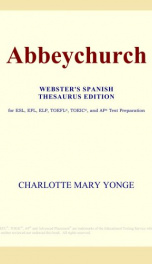
Abbeychurch
Series:
Unknown
Year:
Unknown
Raiting:
2.44/5
From the preface to a book: The later story was a rather hasty attempt to parody the modern sensation novel, as Northanger Abbey did the Radclyffe school, but it makes the mistake of having too real a mystery. However, such as they are, the two stories go forth in company, trusting that they may not prove too utterly wearisome to be brought forward this second time.
“Abbeychurch”, written in 1844 by Charlotte Mary Yonge, a nineteenth century English novelist, focuses on the problem of self development through self control.
Show more
add to favoritesadd In favorites
“Abbeychurch”, written in 1844 by Charlotte Mary Yonge, a nineteenth century English novelist, focuses on the problem of self development through self control.
Show more
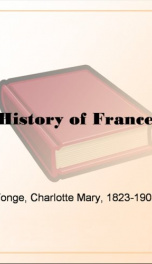
History of France
Series:
Unknown
Year:
Unknown
Raiting:
1/5
This book was converted from its physical edition to the digital format by a community of volunteers. You may find it for free on the web. Purchase of the Kindle edition includes wireless delivery.
Show more
add to favoritesadd In favorites
Book list

Abbeychurch
Series:
Unknown
Year:
Unknown
Raiting:
2.44/5
From the preface to a book: The later story was a rather hasty attempt to parody the modern sensation novel, as Northanger Abbey did the Radclyffe school, but it makes the mistake of having too real a mystery. However, such as they are, the two stories go forth in company, trusting that they may not prove too utterly wearisome to be brought forward this second time.
“Abbeychurch”, written in 1844 by Charlotte Mary Yonge, a nineteenth century English novelist, focuses on the problem of self development through self control.
Show more
add to favoritesadd In favorites
“Abbeychurch”, written in 1844 by Charlotte Mary Yonge, a nineteenth century English novelist, focuses on the problem of self development through self control.
Show more

History of France
Series:
Unknown
Year:
Unknown
Raiting:
1/5
This book was converted from its physical edition to the digital format by a community of volunteers. You may find it for free on the web. Purchase of the Kindle edition includes wireless delivery.
Show more
add to favoritesadd In favorites
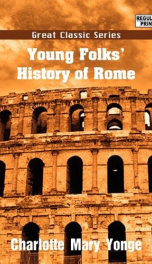
Young Folks' History of Rome
Series:
Unknown
Year:
Unknown
Raiting:
2.5/5
Charlotte Mary Yonge (1823-1901), was an English novelist, known for her huge output. She was devoted to the Church of England, and much influenced by John Keble, a near neighbour and one of the leaders of the Oxford Movement. Her novels reflected the values and concerns of Anglo-Catholicism. She began writing in 1848, and published during her long life about 100 works, chiefly novels. Her first commercial success, The Heir of Redclyffe (1854), provided the funding to enable the schooner Southern Cross to be put into service on behalf of George Selwyn. Similar charitable works were done with the profits from later novels. She was also editor, for nearly forty years, of a magazine for young ladies, the Monthly Packet. Among the best known of her works are Heartsease; or, The Brother's Wife (1854), The Daisy Chain; or, Aspirations (1856), A History of Christian Names (1863, revised 1884), A Book of Golden Deeds (1864), The Dove in the Eagle's Nest (1866), Life of John Coleridge Patteson: Missionary Bishop of the Melanesian Islands (1873) and Hannah More (1888). --This text refers to an alternate Paperback edition.
Show more
add to favoritesadd In favorites

Young Folks' History of England
Series:
Unknown
Year:
Unknown
Raiting:
3.5/5
This volume is produced from digital images created through the University of Michigan University Library's preservation reformatting program. The Library seeks to preserve the intellectual content of items in a manner that facilitates and promotes a variety of uses. The digital reformatting process results in an electronic version of the text that can both be accessed online and used to create new print copies. This book and thousands of others can be found in the digital collections of the University of Michigan Library. The University Library also understands and values the utility of print, and makes reprints available through its Scholarly Publishing Office.
Show more
add to favoritesadd In favorites
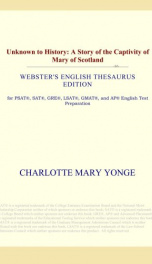
Unknown to History: a story of the captivity of Mary of Scotland
Series:
Unknown
Year:
Unknown
Raiting:
3.5/5
This book was converted from its physical edition to the digital format by a community of volunteers. You may find it for free on the web. Purchase of the Kindle edition includes wireless delivery.
Show more
add to favoritesadd In favorites
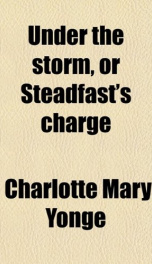
Under the Storm
Series:
Unknown
Year:
Unknown
Raiting:
3.5/5
This book was converted from its physical edition to the digital format by a community of volunteers. You may find it for free on the web. Purchase of the Kindle edition includes wireless delivery.
Show more
add to favoritesadd In favorites
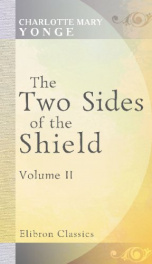
The Two Sides of the Shield
Series:
Unknown
Year:
Unknown
Raiting:
2.5/5
This Elibron Classics book is a facsimile reprint of a 1885 edition by Bernhard Tauchnitz, Leipzig.
Show more
add to favoritesadd In favorites

Two Penniless Princesses
Series:
Unknown
Year:
Unknown
Raiting:
3.5/5
This book was converted from its physical edition to the digital format by a community of volunteers. You may find it for free on the web. Purchase of the Kindle edition includes wireless delivery.
Show more
add to favoritesadd In favorites
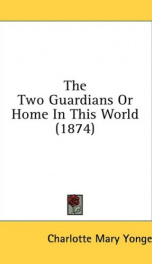
The Two Guardians
Series:
Unknown
Year:
Unknown
Raiting:
4.5/5
This Elibron Classics book is a facsimile reprint of a 1869 edition by Bernhard Tauchnitz, Leipzig. Series: Collection of British Authors. Tauchnitz Edition. Vol. 1040 --This text refers to the Paperback edition.
Show more
add to favoritesadd In favorites
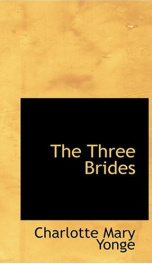
The Three Brides
Series:
Unknown
Year:
Unknown
Raiting:
1.5/5
The marriage of the third son had been a much greater surprise. Compton Poynsett was not a family living; but the patron, hearing of Julius Charnock as a hard-working curate in a distant seaport, wrote to offer it to him; and the same letter to Mrs. Poynsett to offer it to him; and the same letter to Mrs Poynsett which conveyed this gratifying intelligence, also informed her of his having proposed to the daughter of the commanding officer of the regiment stationed at the town where lay his present charge.
By Charlotte Mary Yonge, a nineteenth century English novelist.
Show more
add to favoritesadd In favorites
By Charlotte Mary Yonge, a nineteenth century English novelist.
Show more
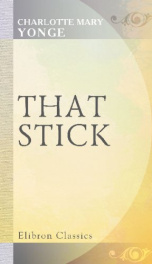
That Stick
Series:
Unknown
Year:
Unknown
Raiting:
4.5/5
This Elibron Classics book is a facsimile reprint of a 1892 edition by Bernhard Tauchnitz, Leipzig.
Show more
add to favoritesadd In favorites
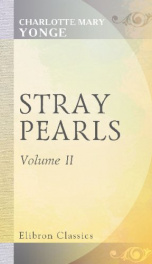
Stray Pearls
Series:
Unknown
Year:
Unknown
Raiting:
1/5
This Elibron Classics book is a facsimile reprint of a 1883 edition by Bernhard Tauchnitz, Leipzig.
Show more
add to favoritesadd In favorites
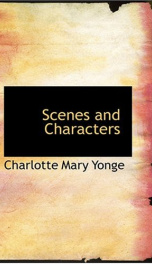
Scenes and Characters
Series:
Unknown
Year:
Unknown
Raiting:
4.5/5
You feel it, though you will not allow it,' said Lily. 'Now think of Emily's sympathy, and gentleness, and sweet smile, and tell me if she is not a complete personification of love. And then Eleanor, unpoetical--never thrown off her balance by grief or joy, with no ups and downs--no enthusiasm--no appreciation of the beautiful--her highest praise "very right," and tell me if there can be a better image of duty.' --This text refers to the Paperback edition.
Show more
add to favoritesadd In favorites
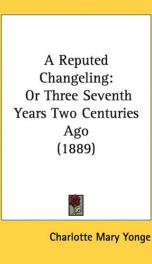
A Reputed Changeling
Series:
Unknown
Year:
Unknown
Raiting:
4/5
Such were the words of two little girls walking home from a school for young ladies kept at the Cathedral city of Winchester by two Frenchwomen of quality refugees from the persecutions preluding the Revocation of the Edict of Nantes and who enlivened the studies of their pupils with the Contes de Commere L¿Oie. --This text refers to an alternate Paperback edition.
Show more
add to favoritesadd In favorites
What readers are saying
What do you think? Write your own comment on this author!
write a commentGenre
- Literature & Fiction
- Literature & Fiction / Contemporary
- Literature & Fiction / Classics
- Religion & Spirituality / Christianity / Literature & Fiction / Fiction
- Computers & Internet / Home Computing / Internet
- Law / United States
- Reference / Words & Language
- Books / Lindsay, Vachel,1879-1931 / Golden book of Springfield
if you like Yonge Charlotte Mary try:
readers also enjoyed
What readers are saying
What do you think? Write your own comment on this author!
write a commentGenre
- Literature & Fiction
- Literature & Fiction / Contemporary
- Literature & Fiction / Classics
- Religion & Spirituality / Christianity / Literature & Fiction / Fiction
- Computers & Internet / Home Computing / Internet
- Law / United States
- Reference / Words & Language
- Books / Lindsay, Vachel,1879-1931 / Golden book of Springfield
if you like Yonge Charlotte Mary try:
readers also enjoyed
Do you want to exchange books? It’s EASY!
Get registered and find other users who want to give their favourite books to good hands!


